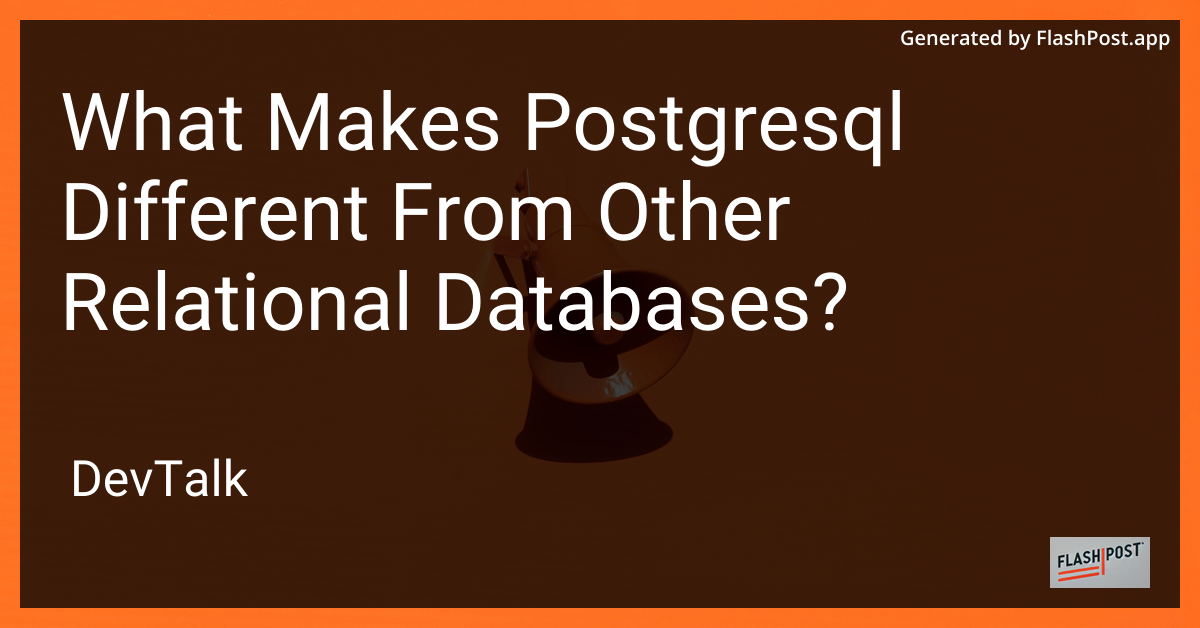What Makes Postgresql Different From Other Relational Databases?

What Makes PostgreSQL Different from Other Relational Databases?
In the vast world of relational database management systems (RDBMS), PostgreSQL stands out as a strong contender due to its robustness, feature richness, and open-source nature.
While there are several other popular RDBMS like MySQL, Oracle, and SQL Server, PostgreSQL offers distinct advantages and characteristics that make it a preferred choice for many developers and database administrators. In this article, we'll explore what differentiates PostgreSQL from its competitors.
1. Open Source and Extensible
One of the most compelling features of PostgreSQL is its open-source nature. This provides transparency, flexibility, and the ability to customize or extend the database system to suit specific needs. The community-driven model ensures continuous improvements and rapid integration of new technologies.
Moreover, the extensibility of PostgreSQL allows users to define new data types, operators, and even entire index methods. This level of customization is rarely matched by other databases, particularly proprietary ones.
2. Advanced Features
PostgreSQL supports a range of advanced data types and capabilities that many databases lack. Some of these features include:
- Support for JSON and JSONB: PostgreSQL integrates well with NoSQL features, allowing storage and efficient querying of JSON data.
- Array Data Types: It supports advanced data types such as arrays and can perform operations on them smoothly.
- Hstore: A key-value store within PostgreSQL that makes it suitable for handling semi-structured data.
3. ACID Compliance and Concurrency
PostgreSQL is fully ACID compliant (Atomicity, Consistency, Isolation, Durability), ensuring reliability for transactional data. Its sophisticated concurrency control, using multi-version concurrency control (MVCC), allows high efficiency in read-write environments by reducing lock contention.
4. Rich Indexing Options
PostgreSQL supports a myriad of indexing techniques, such as B-tree, Hash, GIN (Generalized Inverted Index), GiST (Generalized Search Tree), and BRIN (Block Range INdex). These diverse options enable performance tuning tailored to specific workload requirements.
5. SQL Compliance
As one of the most SQL-compliant databases, PostgreSQL adheres closely to the SQL standard, ensuring a broad and familiar query language for its users. This aids developers in transitioning from systems like Oracle or SQL Server without significant rework.
6. Community Support and Documentation
The PostgreSQL community is vast and active, providing extensive documentation and numerous extensions. The community’s commitment facilitates a wide range of resources and a supportive environment for troubleshooting and optimization.
7. Integration Capabilities
PostgreSQL can seamlessly interact with different systems. For instance, you can connect a PostgreSQL database to Oracle for diverse use cases, ensuring flexibility across various enterprise environments.
Conclusion
PostgreSQL’s blend of traditional relational database strengths with modern features and extensibility sets it apart from many of its counterparts. Its open nature and the robust community backing it are just the cherries on top for this versatile RDBMS.
Explore more about PostgreSQL's binary timestamp parsing, learn how to fix specific errors like column does not exist, or dive into specific tasks like extracting a relative path from a URL.
Embrace PostgreSQL for its full potential and experience database management like never before!